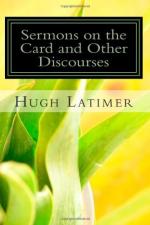their wickedness still to the very end; they made
an end in their wickedness. But we cannot judge
whether one of us sin this sin against the Holy Ghost,
or not; for though a man be wicked at this time, yet
he may repent, and leave his wickedness tomorrow,
and so not commit that sin against the Holy Ghost.
Our Saviour Christ pronounced against the scribes
and Pharisees, that they had committed that sin against
the Holy Ghost; because he knew their hearts, he knew
they would still abide in their wickedness to the very
end of their lives. But we cannot pronounce
this sentence against any man, for we know not the
hearts of men: he that sinneth now, peradventure
shall be turned tomorrow, and leave his sins, and
so be saved. Further, the promises of our Saviour
Christ are general; they pertain to all mankind:
he made a general proclamation, saying,
Qui credit
in me, habet vitam aeternam; “Whosoever
believeth in me hath everlasting life.”
Likewise St. Paul saith,
Gratia exsuperat supra
peccatum; “The grace and mercies of God
exceedeth far our sins.” Therefore let
us ever think and believe that the grace of God, his
mercy and goodness, exceedeth our sins. Also
consider what Christ saith with his own mouth:
Venite ad me, omnes qui laboratis, &c.
“Come unto me, all ye that labour and are laden,
and I will ease you.” Mark, here he saith,
“Come all ye:” wherefore then should
any body despair, or shut out himself from these promises
of Christ, which be general, and pertain to the whole
world? For he saith, “Come all unto me.”
And then again he saith,
Refocillabo vos, “I
will refresh you:” you shall be eased from
the burdens of your sins. Therefore, as I said
before, he that is blasphemous, and obstinately wicked,
and abideth in his wickedness still to the very end,
he sinneth against the Holy Ghost; as St. Augustine,
and all other godly writers do affirm. But he
that leaveth his wickedness and sins, is content to
amend his life, and then believing in Christ, seeketh
salvation and everlasting life by him, no doubt that
man or woman, whosoever he or they be, shall be saved:
for they feed upon Christ, upon that meat that God
the Father, this feast-maker, hath prepared for all
his guests.
You have heard now who is the maker of this feast
or banquet: and again, you have heard what meat
is prepared for the guests; what a costly dish the
house-father hath ordained at the wedding of his son.
But now ye know, that where there be great dishes
and delicate fare, there be commonly prepared certain
sauces, which shall give men a great lust and appetite
to their meats; as mustard, vinegar, and such like
sauces. So this feast, this costly dish, hath
its sauces; but what be they? Marry, the cross,
affliction, tribulation, persecution, and all manner
of miseries: for, like as sauces make lusty the
stomach to receive meat, so affliction stirreth up
in us a desire to Christ. For when we be in
quietness, we are not hungry, we care not for Christ:




